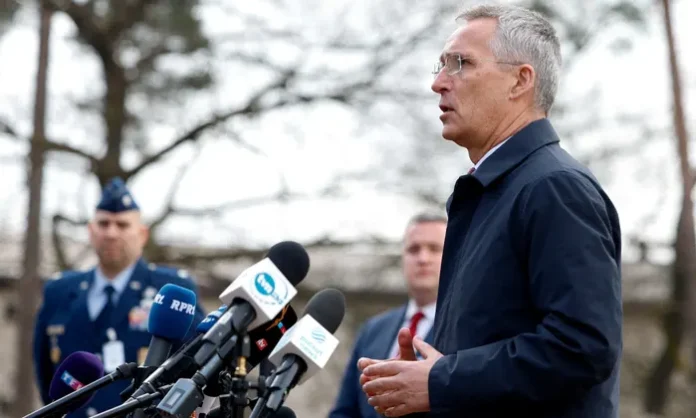The NATO secretary general, Jens Stoltenberg, has said all member countries have agreed that Ukraine will eventually join the transatlantic military alliance once the war is over, ahead of a meeting of Western defence ministers discussing further military aid for Kyiv.
Further announcements on weapons and support are expected after the summit at the Ramstein airbase in Germany, but Stoltenberg also sounded notably upbeat about Ukraine’s longer-term prospects for joining NATO.
“All NATO allies have agreed that Ukraine will become a member,” he said. “President Zelensky has a very clear expectation, we discussed this.
“Both the issue of membership but also security guarantees, and of course Ukraine needs security. Because no one can tell when and how this war ends. But what we do know is that when the war ends, we need to ensure that history doesn’t repeat itself.”
NATO membership, carrying with it a commitment from all member countries to protect each other if attacked, has long been a demand from Kyiv. Although NATO agreed in principle in 2008 that Ukraine could be allowed to join, the country has never been given a formal pathway to membership.
The outbreak of fighting with Russia, which dates back to 2014, has also acted as a further deterrent to NATO members because immediate membership for Ukraine would entail an immediate conflict with a nuclear-armed Moscow, which the US and other member states have made clear they will not contemplate.
Zelenskiy is scheduled to attend NATO’s next annual summit in Vilnius, Lithuania, in July, but Ukrainian officials have said they want the alliance to agree on a roadmap to membership as a condition for his attendance. Kyiv applied for an accelerated membership last September.
Stoltenberg had travelled to Kyiv on Thursday, the first time the NATO chief had visited the country since the start of the all-out war, where he said the alliance must ensure Ukraine “prevails” in the fighting. His fresh remarks indicate a willingness to edge forward Ukraine’s case for joining.
But one key member cautioned against any rapid development. The German defence minister, Boris Pistorius, said in a Thursday night interview on German television: “The door is open a crack, but this is not the time to decide now.”
Defence ministers and other representatives from 50 countries attended the meeting on Ramstein. Afterwards, Lloyd Austin, the US defence secretary, said that “what Ukraine needs most urgently is around based air defences capability” to protect its people, infrastructure and front-line forces.
His comments appeared to tally with a warning in one of the recently leaked Pentagon files that Ukraine was about to due to run of missiles for its S-300 air defence systems, which protect cities and infrastructure, on May 2. Other missiles for Buk systems used to protect troops had already run out, it said.
Also present was Ukraine’s defence minister Oleskii Reznikov, who said that his country had received so many donations from NATO and other Western countries that his country was “already a part of the Alliance’s security space”. He added that he hoped this would speed up Ukraine’s full entry into NATO.
EU countries were haggling over how to fulfil a promise to supply Ukraine with ammunition, following criticism from Kyiv that delays were costing lives. France, backed by Greece and Cyprus, is pressing to ensure that an EU plan to purchase €1bn (£884m) of ammunition for Ukraine is fulfilled via a fully-EU supply chain.
On Thursday, Ukraine’s government criticised the EU over its “inability” to fulfil a promise to supply desperately needed ammunition. Sounding a rare note of irritation against the bloc, Ukraine’s foreign minister, Dmytro Kuleba, said the EU’s inability to implement its own decision was frustrating. “For Ukraine, the cost of inaction is measured in human lives,” he tweeted.
EU ministers agreed last month to supply Ukraine with €2bn of ammunition to replace dwindling stocks. The EU is spending €1bn to reimburse member states for sending ammunition from their supplies, a process that is underway.
It has also pledged to jointly purchase a further €1bn of shells for Ukraine from arms manufacturers in the EU and Norway. But translating that political agreement into a legally binding text has hit a snag. Paris insists that all components of the 155mm shells should come from EU suppliers, a problem for EU companies that use non-EU suppliers.
With EU foreign affairs ministers due to meet on Monday, officials nevertheless voiced confidence the spat could be quickly resolved. “It is our impression that a solution is near,” said one senior official.













